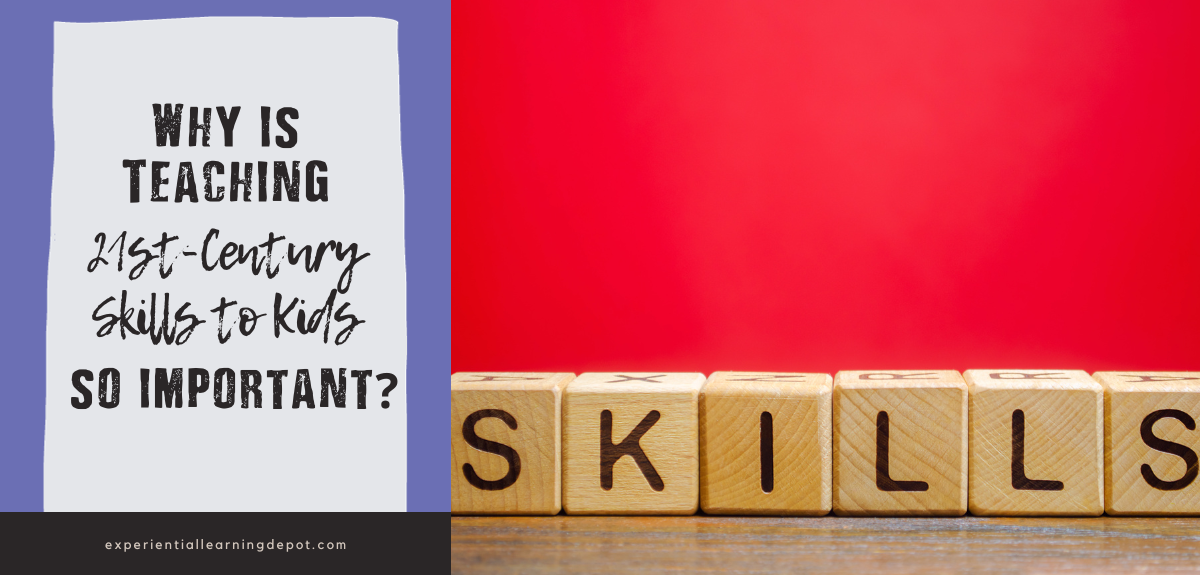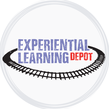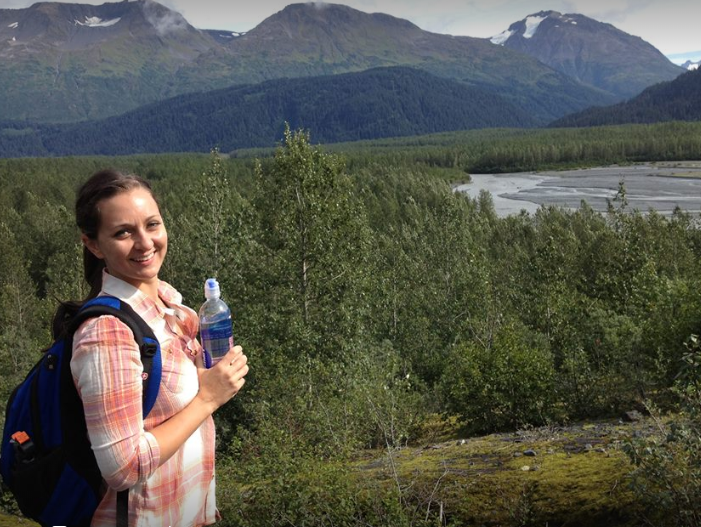|
Experiential learning resources for the innovative educator
What are 21st century skills in education and why are 21st century skills important for 21st-century learners? In short, soft skills are essential for modern day life and the workplace. Therefore, teaching 21st century skills, in my opinion, is as important as teaching content. But why? Let me paint you a little picture... It is spring of 2020 and you are an urban high school biology teacher. Suddenly a pandemic hits and you are asked to translate 10 years of in-person lessons to remote learning activities, a concept you'd never imagined possible. Those college courses on learning theory are suddenly irrelevant. Your teaching portfolio, with a decade of science experiment ideas attached are suddenly useless. So what do you do? You HAVE to be adaptable. You HAVE to be creative. You HAVE to be tech literate. You HAVE to be a problem-solver. You need those skills because not a single college course prepared you for this storm of the century. If you're reading this right now, this story is close to home because it was the reality for most of you. You might be saying to yourself, "well, the pandemic was unprecedented." It might have been, and it might seem like an extreme example, but the world is always evolving, and it's doing so at a rapid pace. If it's not a pandemic that makes us stop and ask what our educational priorities are, it will be something else. So let's look at a more common place example if you're not into the pandemic one. Let's say one of your graduates just lands a summer job in their field of interest. It is their first day on the job and their supervisor casually asks the student to create an infographic for their Pinterest campaign and to have it ready by morning. The student has never created an infographic before nor have they used Pinterest for marketing. The student knows, however, that her neighbor is a graphic designer, so reaches out to ask about user-friendly graphic design programs. That student then hops on Youtube to learn how to use the suggested program. She researches optimal Pin sizes and explores data for Pinterest best-practices and strategies for search optimization. She refines her design through trial and error and eventually lands on something she can be proud to share with her supervisor. So again, what are 21st century skills in education? This student demonstrates those skills beautifully. This student not only keeps her job, but demonstrates to her employers that she has the soft skills, the 21st-century competencies, that make her an asset to the team. In just one task she demonstrates competence in a number of 21st-century skills including resourcefulness, communication skills, tech literacy, creativity, problem-solving, independence, research skills, and so much more. Her GPA or an A on an exam did not prepare her for this task. Her skills did. It's not always easy teaching 21st-century skills. It might feel like another task added to an already full plate, or you might have no idea where to begin. That is the purpose of this 21st-century skills blog series. The benefits of adding 21st-century skill-building to your curriculum are powerful and persuasive, so I encourage you to read on. There are also some amazing strategies for teaching 21st-century skills to 21st-century learners that make the process easy and seamless. Click the link to check out some of those strategies. What are 21st-Century Skills in Education and Why Are They So Important?1. Being Ready for Change: The pandemic example already mentioned shows how important it is to not only anticipate change but to be ready for it and know what to do when it hits. The world is changing all of the time, and quickly at that. Let's talk about technology for a second. I am in a career where being up to date with technology is required. Yet technology changes CONSTANTLY. Just when I think I've mastered a program something changes about it or that program disappears entirely and I need to either adapt or start from scratch. I mean, look at AI and how quickly it's come about? Adapting to that vast and sudden change is a skill. Ed-tech is always changing and I need to be ready and prepared for that to best serve my students; those that are counting on me for relevant technology and resources. What are 21st century skills in education that prepare students for change?Adaptability, resourcefulness, creativity, problem-solving skills, working well under pressure, open-mindedness, and more. 2. Being able to Find and Navigate Information: There is an enormous amount of information out there at our disposal; literally at our fingertips. When I was a kid we didn't "Google" anything. If we needed a question answered we had to track down an encyclopedia, visit a library, or talk directly to an expert. It made a little more sense at the time to memorize information. It was useful then. Now we have access to information literally anytime, anywhere. What is relevant now is being able to navigate the plethora of information out there; it is being able to locate, organize, and make use of credible and accurate information. What are 21st century skills in education that prepare students for navigating information? Inquiry skills, resourcefulness, problem-solving, research skills, information literacy, critical thinking, tech literacy. 3. Tools for Real-World Problem-Solving: Problem-solving is an important skill in itself, but being able to apply problem-solving skills to real-world issues and scenarios is critical. Students need to be able to exit your classroom, get into their careers, have and raise children, navigate relationships, recognize when they're being taken advantage of, resolve conflict in the workplace, etc. without you there holding their hands. They need to be able to take those problem-solving skills that they were taught within the confines of the context of your classroom and apply them to real problems that surface in their lives, and yes, there will be many. There are a variety of ways to teach problem-solving skills that have relevance and meaning to students. 4. 21st-Century Skills Build Character: Twenty-first century skill-building opportunities help students build character. It is important as collaborative and social beings that children have empathy, compassion, are ethical, have integrity, work well with others, and so much more. I used to work with endangered species research programs before getting into education. I supervised a team of field technicians on a raptor project in FL for two years and needed to hire a crew. Having a basic understanding of ecological concepts was necessary for new hires, but what I was really looking for were employees that would work well with others, that were reliable, productive, and had good work ethics. I knew that they could learn how to capture and release the birds. They would learn very quickly how to identify, track, and record the birds' locations. They would develop those techniques quickly through immersion and experience. I did not have time, however, to teach new hires how to be team players or show up for work. What are 21st century skills in education that build character? Empathy, reliability, punctuality, dependability, integrity, works well with others, ethics, and more. 5. Competitive in the Workplace: This particular reason for adding 21st-century skill-building to your curriculum is a blend of all of the other reasons I talk about in this post. Having good character, as the example above illustrates, is essential. An employee might have a high GPA or a deep understanding of the discipline, but if they can't get along with others in a collaborative work environment they will struggle. Or if an employee understands the concept of habitat fragmentation but is unable to problem-solve innovative solutions to the problem in a real-world context they will struggle to maintain a career in conservation biology. Content understanding is simply not enough, and this is a common sentiment among employers across most lines of work. Bottom line? If your students do not have these skills someone else's students will, and they will be the ones to land those jobs. What are 21st century skills in education that help students stay competitive in the workplace? I would argue that most 21st-century skills are important, but commonly cited skills by employers include creativity, problem-solving, collaboration, critical thinking, and communication skills. 6. Because Everyone Else is Doing It: Hop on the bandwagon! Here is what I mean by that: The world is changing, we've established that. You and your students must change with it. Your students are at a disadvantage if they do not possess the skills to live happily and successfully in the 21st-century. It is a very different time than 50 years ago. Heck, it's entirely different than it was 10 years ago. This is progress, and there are enormous benefits to progress. Let your students be a part of that. Again, let's look at technology: Tech frustrates me to no end. I don't enjoy spending my time learning new programs and navigating tech that changes by the second. But technology is here, it is here to stay, and I do not anticipate it slowing down in the foreseeable future. So while other teachers are embracing technology, so too must I for the sake of my students. I cannot hold my students back and I urge you not to either. 7. Promote and Foster Innovation: Yes, 21st-century skills are important for individuals. Students will fare better in their careers, for example, and better maneuver life's personal challenges that are inevitably thrown their way. But another reason for teaching 21st-century skills in your classroom is for the greater good. Many skills are important for the advancement of society, innovation being among them. Innovation gives rise to economic, social, ecological, and cultural improvements because complex societal problems are creatively solved. What are 21st century skills in education that promote innovation? Creativity, critical thinking, collaboration, intelligent risk-taking, lifelong learning, curiosity and inquiry, problem-solving, and more. As I've already said, this doesn't have to be difficult. The remainder of my 21st century skills blog series is all about the practice of teaching 21st-century skills. How about some 21st century skills learning activity resources? Let's work together! Click the links below to learn more: Join our experiential learning Facebook group! Did you know there is an experiential learning Facebook group? Check that out - Experiential Learning Community for K12 Teachers - and join in the discussion about experiential learning ideas! Find us on social media! Follow Experiential Learning Depot on Pinterest, Facebook, Youtube, and Instagram for more on experiential education, and check out my shop for experiential learning resources. Looking for relevant blog posts? Look no further! Have you taken a look at Experiential Learning Depot's Youtube Page? Observe. Question. Explore. Share.
5 Comments
6/29/2021 06:30:23 am
I really like the title that you have given to this article. It is really very catchy and teaching the 21st century learners the skills of 21st century is very crucial and must not be delayed. Proper training must be provided to teach them these skills. Thank you,
Reply
Experiential Learning Depot
6/29/2021 07:39:35 am
Thank you, Bhuvi Kumar! I think it’s important also. I’m glad you like the article.
Reply
6/29/2022 08:23:01 am
Thanks for the wonderful article. You are right soft skills are essential for modern day life, but sadly still the conventional education system still tries to function around obsolete ideas of imparting textbook driven knowledge, which anyone can get from a simple google search. Agree with your point of view of imparting real world problem solving skills. Thanks again for the article.
Reply
10/3/2022 03:57:11 pm
Thank you for this! Be ready for change and be innovative, I agree. The 21st century learneres are really "built different," and proper education can really help them maximize their full potentials.
Reply
Your comment will be posted after it is approved.
Leave a Reply. |
Blog IntentTo provide innovative educational resources for educators, parents, and students, that go beyond lecture and worksheets. AuthorSara Segar, experiential life-science educator and advisor, curriculum writer, and mother of two. Categories
All
|











 RSS Feed
RSS Feed